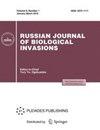夜蝠(nyctalus nocctula)在罗斯托夫地区的分布及其越冬区北部边界扩展问题
IF 0.6
Q4 ECOLOGY
引用次数: 0
摘要
介绍了罗斯托夫地区夜蛾分布的资料。在此基础上,明确了其冬季栖息地的北部边界和停留的季节特征。本文在夏季和淡季对该地区南部和极东部进行的调查结果表明,该地区在迁徙期间和夏季都被用作栖息地。在科学文献中,在过去的几十年里,这个物种的冬季活动范围扩大了。在城市高层建筑中发现的越冬动物被认为是证实扩张的事实。然而,关于越冬边界扩大的问题仍然模糊不清,因为所有这些检测都是在气候“危险区”进行的。在自然掩体(树洞)条件下对夜蛾冬季栖息地概率面积的模拟结果表明,在过去的70年中,夜蛾的边界没有发生变化,其北部边界与先前的预测不一致。在这个物种的欧洲范围的东部,自然越冬区的北部边界穿过罗斯托夫地区,并在阿斯特拉罕市的纬度向东结束。在这样一个区域内决定越冬的最重要的生物气候因素是一年中最干燥季节的平均温度和最冷季节的平均温度,以及最冷月份的最低温度。在该地区以北的地区,由于严冬,动物不太可能在自然避难所越冬。根据所获得的结果,将斑胸草的整个越冬区划分为两个区。第一个区域是大量越冬的地方,可能在保护不力的自然避难所;第二个区域是一个具有气候“危险区域”的区域,在那里只有很小一部分物种的种群仍然存在,并且在多层建筑的定居点中保护免受外部因素的空间作为避难所。在第二区发现了远离自然越冬区的结节越冬群,这显然可以认为是一种入侵过程,在迁徙蝙蝠中具有适应性,与城市化景观的发展有关。本文章由计算机程序翻译,如有差异,请以英文原文为准。
DISTRIBUTION OF THE NOCTULE BAT (NYCTALUS NOCTULA) IN THE ROSTOV REGION AND THE PROBLEM OF EXPANDING THE NORTHERN BOUNDARY OF ITS WINTERING AREA
The materials on the distribution of Nyctalus noctula in the Rostov Region are given. Based on this the northern border of its winter habitat and the seasonal characteristics of the stay are specified. The presented findings of this species in the south and extreme east of the region, which were made in the summer and in the off season showed that this territory was used both during the migration period and as summer habitats. In the scientific literature the expansion of the winter range of this species over the past decades has been noted. Findings of wintering animals in high-rise buildings of cities are considered as confirming facts of expansion. However, the issue regarding the expansion of wintering boundaries remains ambiguous because all these detections are made in the climatic "risk zone". The results of modeling of the probabilistic area of winter habitats of N. noctula in conditions of natural shelters (hollows of trees) showed that over the past 70 years there have been no changes in the boundaries and its northern limits do not correspond to those that were previously indicated. In the east of the European range of this species the northern boundary of the natural wintering area passes through the Rostov Region and ends to the east at the latitude of the city of Astrakhan. The most important bioclimatic factors that determine wintering within such a territory are the average temperature of the driest and the average temperature of the coldest quarters of the year, and the minimum temperature of the coldest month. In the regions to the north of this area due to the severity of winters the overwintering of animals in natural shelters is unlikely. Based on the obtained results the total wintering area of N. noctula is divided into two zones. The first zone is the territory where wintering is massive and possible in poorly protected natural shelters; the second zone is a territory with a climatic “risk zone”, where only a very small part of population of the species remains, and the spaces protected from external factors in multi-storied buildings of settlements serve as shelters. Findings of wintering colonies of noctules in the second zone that located far outside the natural wintering area can obviously be considered as an invasive process, which in migratory bats has an adaptive character and associated with the development of urbanized landscapes.
求助全文
通过发布文献求助,成功后即可免费获取论文全文。
去求助
来源期刊
CiteScore
1.20
自引率
14.30%
发文量
40
期刊介绍:
Russian Journal of Biological Invasions publishes original scientific papers dealing with biological invasions of alien species in both terrestrial and aquatic ecosystems and covers the following subjects:description of invasion process (theory, modeling, results of observations and experiments): invasion corridors, invasion vectors, invader species adaptations, vulnerability of aboriginal ecosystems;monitoring of invasion process (reports about findings of organisms out of the limits of natural range, propagule pressure assessment, settling dynamics, rates of naturalization);invasion risk assessment; genetic, evolutional, and ecological consequences of biological invasions of alien species; methods, means of hoarding, processing and presentation of applied research data (new developments, modeling, research results, databases) with factual and geoinformation system applications;use of the results of biological invasion research (methods and new basic results) under the study of marine, fresh-water and terrestrial species, populations, communities and ecosystems; control, rational use and eradication of the harmful alien species..

 求助内容:
求助内容: 应助结果提醒方式:
应助结果提醒方式:


